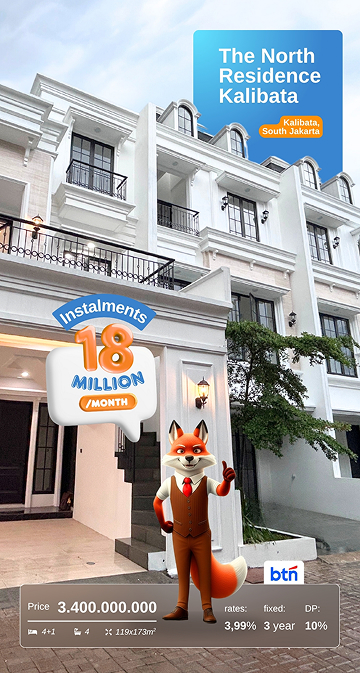Understand the Differences Between Sharia and Conventional Mortgages
Buying a dream home is a major financial decision for most people, and a mortgage loan is the most common way to make it happen. In many countries, including Indonesia and the UK, buyers can choose between Islamic mortgages and conventional mortgages.
Although both are designed to help individuals purchase property, they operate on different financial principles. Conventional bank mortgages rely on interest-based loans, while Islamic bank mortgages follow Islamic financial rules that prohibit interest (riba) and encourage risk sharing.
This article explores the key differences between the two types of mortgages and outlines the advantages of each, helping prospective buyers make informed decisions when seeking financing to pay for their home.
What is a Conventional Mortgage?
A conventional mortgage is a loan offered by a bank or financial institution to home buyers. The loan is repaid by the borrower over a certain period (usually 15–30 years), along with interest.
How does it work?
The bank provides the loan to the customer in the form of a cash amount. The customer or borrower then repays this amount in monthly instalments or mortgage payments. Interest is charged on the outstanding loan balance.
Conventional mortgages can have a fixed interest rate (the interest rate remains the same) or a variable interest rate (the interest rate changes according to market conditions).
What is Sharia Housing Credit?
Sharia housing credit, also known as Islamic housing credit, is structured in accordance with Islamic law (Sharia), which prohibits riba (interest). Instead, alternative structures such as Murabahah, Ijara, or Musharaka are used.
How does it work?
Murabahah Contract: The bank purchases the property and sells it to the buyer at a higher price, with the option of instalment payments.
Ijara Contract: The bank purchases the property and leases it to the buyer. The buyer pays rent and can purchase the property at the end of the lease term.
Musharaka Agreement: The bank and the buyer jointly own the property. The buyer gradually purchases the bank's share of the property over time.
In all of these structures, there is no interest. Instead, profits and risks are shared, and the terms are transparent.
Key Differences Between Sharia and Conventional Mortgages
The fundamental difference between conventional mortgages and sharia mortgages lies in the transaction scheme used. In conventional mortgages, home ownership is achieved through the provision of a loan, which is then repaid with mortgage interest. Meanwhile, Islamic mortgages use the principle of sale and purchase, where the bank first purchases the house desired by the customer, then resells it at a certain price agreed upon by both parties.
To understand this more deeply, let's look at the following 5 differences between Islamic mortgages and conventional mortgages, which can be important considerations before making a decision regarding home ownership.
1. Interest vs. Profit Sharing between Banks and Customers
Conventional Loans: Conventional loans operate on an interest-based system. The lender provides a sum of money to the borrower, who is then required to repay that amount within an agreed period of time, plus additional interest. Kredit konvensional beroperasi berdasarkan sistem bunga. Pemberi pinjaman memberikan sejumlah uang kepada peminjam, yang kemudian diwajibkan untuk mengembalikan jumlah tersebut dalam jangka waktu yang disepakati beserta bunga tambahan.
Interest represents the cost of borrowing and continues to apply until the loan is fully repaid. The longer the loan term, the more interest the borrower has to pay, which means that the final payment amount is often much higher than the initial loan.
Conventional mortgages often have floating interest rates, which cause the interest margin to rise dramatically in the 10th or 15th year.
Sharia Housing Loans: Under Sharia law, interest (riba) is strictly prohibited. Instead, Sharia housing loans adopt a profit-sharing or rental model. Customers do not need to pay additional fees because Sharia banks waive administration and provision fees from the customer's credit limit or financing amount. Berdasarkan hukum syariah, bunga (riba) dilarang secara ketat. Sebagai gantinya, kredit perumahan syariah mengadopsi model pembagian keuntungan atau sewa. Nasabah tidak perlu membayar biaya tambahan karena Bank Syariah membebaskan biaya administrasi dan provisi dari jumlah plafon atau kredit pembiayaan nasabah.
For example, in the Murabaha scheme, the bank purchases property and sells it to customers at a higher fixed price, which is paid in instalments.
2. Supervision when Applying for a Mortgage
Another difference between conventional and sharia mortgages is the aspect of supervision. In conventional mortgages, all banking activities, including the distribution of home ownership loans, are supervised by general banking authorities, namely Bank Indonesia and the Financial Services Authority (OJK). These institutions serve to ensure that banks' operational activities comply with national banking regulations, maintain financial system stability, and protect customer interests.
Meanwhile, Islamic mortgages offer an additional layer of supervision. In addition to remaining under the supervision of Bank Indonesia and OJK, as is the case with conventional banks, Islamic banks are also supervised by the Sharia Supervisory Board (DPS). The DPS is a special body that works directly based on the provisions of the National Sharia Council - Indonesian Ulema Council (DSN-MUI).
With this dual supervisory mechanism, Islamic mortgages not only ensure compliance with national banking regulations, but also guarantee that all mortgage financing practices are in accordance with sharia values. This is one of the advantages of Islamic mortgages for people who want to own a home while maintaining Sharia-compliant financial principles.
3. Ownership
Conventional Loans: Conventional loans operate on an interest-based system. The lender provides a sum of money to the borrower, who is then required to repay that amount within an agreed period of time, plus additional interest. Conventional Credit: With conventional credit, the buyer is recognised as the legal owner of the property from the outset, even though the property is used as collateral for the loan. If the borrower defaults on their repayments, the lender has the right to take possession of the property through foreclosure.
Sharia Housing Loans: Under Sharia law, interest (riba) is strictly prohibited. Instead, Sharia housing loans adopt a profit-sharing or rental model. Customers do not need to pay additional fees because Sharia banks waive administration and provision fees from the customer's credit limit or financing amount. Sharia Housing Loans: Conversely, ownership in sharia housing loans is often shared between the bank and the customer until the financing agreement is completed.
4. Legal Contract
Conventional Loans: Conventional loans operate on an interest-based system. The lender provides a sum of money to the borrower, who is then required to repay that amount within an agreed period of time, plus additional interest. Conventional Credit: The legal framework for conventional credit is a standard loan agreement between the lender and the borrower. This agreement specifies the principal amount of the loan, the interest rate, the payment schedule, and the consequences in the event of default. The structure is relatively simple, and such contracts are widely recognised in the global banking system.
KPR Syariah: Sharia Mortgage: Sharia-compliant mortgages use agreements that reflect Islamic financial ethics. Instead of a loan, the agreement may be a sale and purchase agreement (Murabahah), a lease agreement (Ijara), or a partnership agreement (Musharaka). Each of these agreements is designed to ensure compliance with Sharia law by avoiding interest and emphasising fairness, transparency, and risk sharing. These agreements are often more detailed and may require additional documentation to meet legal and religious standards.
5. Risk Aspects
Conventional Loans: Conventional loans operate on an interest-based system. The lender provides a sum of money to the borrower, who is then required to repay that amount within an agreed period of time, plus additional interest. Conventional Loans: In a conventional structure, most of the financial risk is borne by the borrower when purchasing a home. Regardless of changes in property value or the borrower's financial condition, the obligation to repay the loan and interest remains constant. If property prices fall, the borrower may have to repay more than the value of the property, without any relief from the lender.
Sharia Housing Loans: Under Sharia law, interest (riba) is strictly prohibited. Instead, Sharia housing loans adopt a profit-sharing or rental model. Customers do not need to pay additional fees because Sharia banks waive administration and provision fees from the customer's credit limit or financing amount. Sharia Housing Loans: The risks in sharia housing loans are more evenly balanced between the bank and the buyer. For example, in a Musharaka agreement, both parties share ownership and therefore share the risks associated with the property. In the event of unforeseen circumstances, the financial burden is not borne entirely by the borrower. This risk-sharing model is designed to create fairness and reduce the potential for exploitation, in line with Sharia principles.
Find out about the best mortgage programmes for your dream home in Indonesia! The Lets Move Group team of consultants is ready to guide you through every step of the mortgage application process. Contact us now!!














